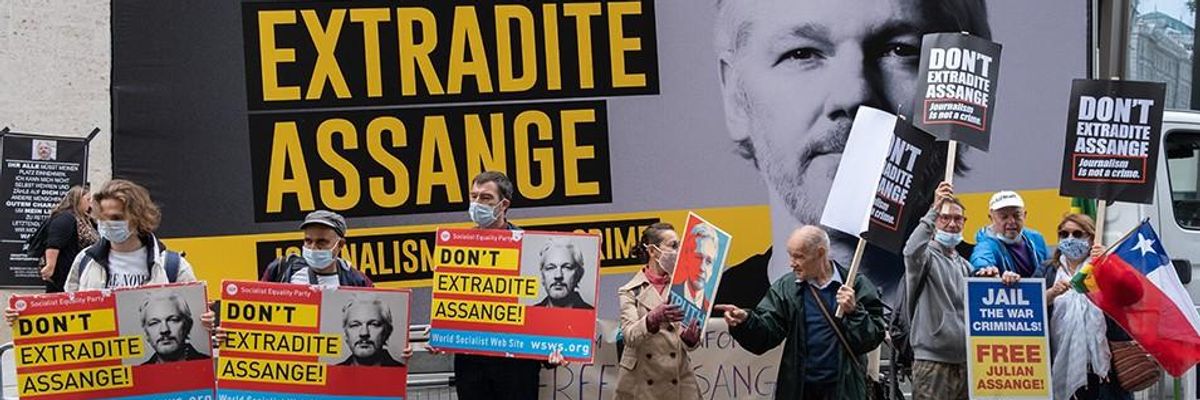US Lawmakers Renew Call for Biden to Drop Charges Against Julian Assange
Original article by BRETT WILKINS republished from Common Dreams under Creative Commons (CC BY-NC-ND 3.0).

“The bottom line is that journalism is not a crime,” said Rep. Jim McGovern. “The stakes are too high for us to remain silent.”
Imploring the Biden administration to “not pursue an unnecessary prosecution that risks criminalizing common journalistic practices,” a bipartisan group of 16 U.S. lawmakers have signed a letter dated Wednesday to President Joe Biden urging him to end the attempted extradition of Julian Assange and drop all charges against the jailed publisher.
“Assange, the founder of WikiLeaks, faces multiple charges under the Espionage Act due to his role in publishing classified documents about the U.S. State Department, Guantánamo Bay, and wars in Iraq and Afghanistan,” states the letter, which is led by Reps. Jim McGovern (D-Mass.) and Thomas Massie (R-Ky.). “He has been detained on remand in London since 2019 and is pending extradition to the U.S., having lost his appeal of the extradition order in the courts of the United Kingdom.”
Assange—who suffers from physical and mental health problems including heart and respiratory issues—published materials, many of them provided by whistleblower Chelsea Manning, exposing U.S. and allied war crimes, including the “Collateral Murder” video showing a U.S. Army helicopter crew killing a group of Iraqi civilians, the Afghan War Diary, and the Iraq War Logs.
“Deep concerns about this case have been repeatedly expressed by international media outlets, human rights, and press freedom advocates, and members of Congress,” the lawmakers wrote. “In April of this year… members of the House argued to Attorney General Merrick Garland that ‘every day that the prosecution of Julian Assange continues is another day that our own government needlessly undermines our own moral authority abroad and rolls back the freedom of the press under the First Amendment at home.'”
The new letter has been signed by Reps. Alexandria Ocasio-Cortez (D-N.Y.), Jamaal Bowman (D-N.Y.), Ayanna Pressley (D-Mass.), Greg Casar (D-Texas), Ilhan Omar (D-Minn.), Cori Bush (D-Mo.), Rashida Tlaib (D-Mich.), Eric Burlison (R-Mo.), Marjorie Taylor Greene (R-Ga.), Paul Gosar (R-Az.), Jesús “Chuy” García (D-Ill.), Pramila Jayapal (D-Wash.), Matthew Rosendale (R-Mont.), and Sen. Rand Paul (R-Ky.).
In a message last month inviting congressional colleagues to sign the letter, McGovern and Massie explained that their goal is”to strongly encourage the Biden administration to withdraw the U.S. extradition request currently pending against Australian publisher Julian Assange and halt all prosecutorial proceedings against him as soon as possible.”
McGovern said last month in a statement to The Intercept that “the bottom line is that journalism is not a crime.”
“The work reporters do is about transparency, trust, and speaking truth to power,” he added. “When they are unjustly targeted, we all suffer the consequences. The stakes are too high for us to remain silent.”
The new letter follows last month’s official state visit of Australian Prime Minister Anthony Albanese, an Assange supporter who raised the jailed journalist’s case with President Joe Biden, insisting that “enough is enough.” A cross-party delegation of Australian lawmakers also traveled to the U.S. ahead of Albanese’s visit in an effort to pressure the Biden administration “to cease its pursuit and prosecution of Julian Assange.”
Imploring Americans to put themselves in Australian shoes, former Australian Deputy Prime Minister Barnaby Joyce told reporters after meeting with U.S. officials during the lawmakers’ trip: “Imagine if the Australian government said, ‘Hey you in Murfreesboro, Tennessee, as far as we’re concerned, you committed a crime, and you’re going to Canberra where we’re going to send you to jail for 175 years,‘ you’d be up us like a rat up a drainpipe.”
According to the United Nations Working Group on Arbitrary Detention, Assange has been arbitrarily deprived of his freedom since he was arrested on December 7, 2010. Since then he has been held under house arrest, confined for seven years in the Ecuadorean Embassy in London while he was protected by the administration of former Ecuadorean President Rafael Correa, and jailed in London’s notorious maximum-security Belmarsh Prison, where he is now.
If fully convicted of the Espionage Act charges, Assange—who fathered two children with attorney Stella Morris, whom he married last year, while holed up in the Ecuadorean Embassy—could be sentenced to 175 years in prison.
Original article by BRETT WILKINS republished from Common Dreams under Creative Commons (CC BY-NC-ND 3.0).
